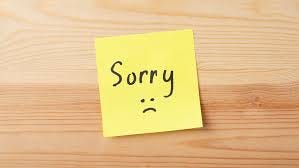This week’s Live on LinkedIn will focus on killing off that guilt you have about taking a rest - because resting, of all things, turns out to be a Future Ready skill as well. Join me at 12:00 PM Eastern Time on LinkedIn.com/events, or check out my profile.
Last week’s Live on LinkedIn focused on one of those hidden Future-Ready skills: making a good apology. Our Industrial Era mental paradigm says that admitting fault makes us look weak, but we only have to look at the latest corporate “apology” - and pay attention to how that makes us feel - to know that the lawyer-driven, cover-your-butt approach can cause more damage to our relationships and reputation than we might realize at the time.
And here’s why that’s so important for us here: trust and reputation are becoming more important than ever, because we can’t command and control our way into people working with us anymore. If we don’t gain and keep the trust of our employees, suppliers, customers, neighbors, etc., we don’t have much else to fall back on.
You can watch the live here, which includes a link to a really good example. Or if you want the TL:DR on that example, here you go:
Say that you were wrong, and express that you understand that what you did hurt someone.
Recap what you learned from the people who told you that what you did was wrong and hurtful. That shows that you were actively listening and understand.
Briefly refer to your own values or priorities, and emphasize that you didn’t live up to those. The first part is important because it indicates that your intentions were higher. But be careful not to linger over your good intentions, because that can quickly turn the apology to being about you and your ego, not about the persons who have been hurt.
Identify steps that you will make to attempt to set the situation right. If you cannot reverse the damage (and most of the time you can’t), then it’s important to do something that demonstrates a willingness to benefit or support those who have been hurt. But be prepared to show receipts, especially if the people who were hurt have been hurt before. There are a lot of people and organizations that will say that they will do something, and then quietly “forget” that they said that.
Make clear that the lines of communication are open and that you are willing to do more.
Even if you do everything above, it’s entirely possible that the person or persons that you hurt don’t accept your apology, or don’t trust you in the aftermath. You have to go into the apology understanding that that might be the outcome. People maintain the right to be mad, or at least to feel that they can’t trust you anymore. Insisting that you should be forgiven won’t make anything better, and will probably make it worse. The best you can do is follow through on the steps you identified in #4 and redouble your efforts to live up to the values you identified in #3.
Remember that trust and integrity are long games, and that organizations and people who are know for their integrity fall down every so often.


